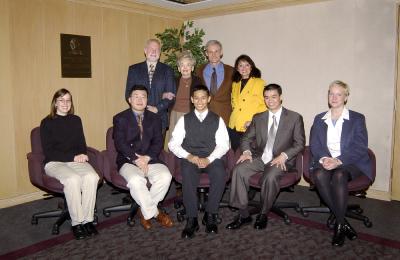March 6, 2003
Magnuson Scholars have support for graduate work
Six graduate students, one from each health sciences school, are working on projects as Magnuson Scholars for the 2002-2003 academic year. Each of the students receives approximately $25,000 to support graduate studies and research.
The late Senator Warren G. Magnuson, in whose name the program was established, was committed to improving the nation’s health through biomedical research and was instrumental in establishing the National Institutes of Health, Medicare and Medicaid during his long career in the senate.
The Magnuson Scholars are selected on the basis of their academic performance and their potential contributions to research in the health sciences.
The scholars program is part of the Warren G. Magnuson Institute for Biomedical Research and Health Professional Training, established in 1991 in honor of the late senator. Support for the Institute comes from two grants totaling nearly $5 million from the U.S. Department of Education, matching funds of $500,000 from the State of Washington, and more than $569,000 in donated funds.
The income from the endowment is used for research about diabetes and other diseases, to support students in graduate or postgraduate health professions training programs, and to fund the Warren and Jermaine Magnuson Chair in Medicine for Neurosciences, held by Dr. Bruce Ransom, chair of the Department of Neurology.
This year’s Magnuson Scholars:
Dr. Nan Hatch, from the School of Dentistry—Hatch earned her degree in dentistry from Harvard School of Dental Medicine after doing her undergraduate work at Tufts University in psychology. In between, she was a full-time skiier for a while and also worked as a technician in a molecular biology lab and took classes. She moved to the UW to take up a residency in the Department of Orthodontics and also began working on a Ph.D. degree from the interdisciplinary Molecular and Cellular Biology Program. Her research focuses on the factors involved in early closure of the sutures in the skull, a condition that results in abnormal bone growth in the head and face. She plans a career that will combine patient care, research and teaching in an academic setting.
Derek Liau, from the School of Medicine—Liau is spending a year between his third and fourth years of medical school at the VA Medical Center in Salt Lake City and the University of Utah Medical Center to conduct research on proper fixation techniques in total knee replacements, a project made possible by the Magnuson Scholarship. He is also working with new techniques to determine bone density in the tibia (one of the lower leg bones) as part of efforts to reduce failures in total knee replacements. Liau graduated from Brigham Young University in Provo, Utah, before entering medical school and was born and grew up in Idaho. He hopes to become an orthopaedic surgeon.
Kristin Gates Cloves, from the School of Nursing—Cloves first earned a bachelor’s degree in theatre and worked in theatre, radio broadcasting and human services before she decided to return to school for a nursing degree. She earned a bachelor of science from the UW School of Nursing in 1998, enrolled in the Psychosocial Advanced Nurse Practitioner master’s degree program, and in 1999 began her work toward a doctoral degree. For the past three years, she has worked as a research assistant with the UW Prison Mental Health Collaboration Project. Her dissertation research will explore and describe barriers to treatment for mentally ill prisoners in Washington state’s super maximum security prison units.
Thy P. Do, from the School of Pharmacy—Do earned a bachelor’s degree in chemistry from Northwestern University, and then moved to New York City, where he earned a master’s degree in chemistry at the State University of New York and also began working with homeless children in the Times Square district, doing HIV/STD education and prevention. This interest led him to Yale University, where he completed a master’s degree in public health. In the fall of 2000, he moved to Seattle to begin working toward a doctorate from the Pharmaceutical Outcomes Research and Policy Program. His research project focuses on patterns of medication use among groups of people with diabetes, and the effects of gaps in use on development of complications.
Dr. Joseph LeMaster, from the School of Public Health and Community Medicine—LeMaster was born in California, raised in Idaho, and earned his medical degree in Kansas. After completing a family medicine residency in Ft. Worth, Texas, he spent two years practicing emergency room medicine in Topeka, Kan., wollowed by 10 years of medical development work in Nepal. He became involved in research while working with Hansen’s disease patients in Nepal from 1998 to 2000. He returned to Seattle to complete a research fellowship in the Department of Family Medicine, and then joined the research team of Dr. Gayle Reiber, associate professor of epidemiology and health services in the School of Public Health. He is investigating foot problems in people with diabetes and is pursuing several projects investigating the role of exercise in relation to complications of diabetes.
Chan-Woo Kim, from the School of Social Work—Kim was born in Korea and earned his master of social work degree from the University of Michigan. He worked for the Adult Day Health Care Center in Los Angeles before coming to the UW School of Social Work to begin his doctoral studies. Working with community-dwelling frail elders, he plans to focus on community-based care management for elders with chronic illness and disability. His goal is to seek better solutions for long-term care for elders and their caregivers.

